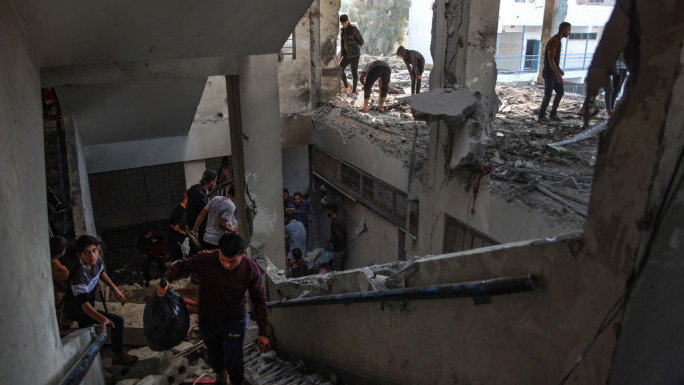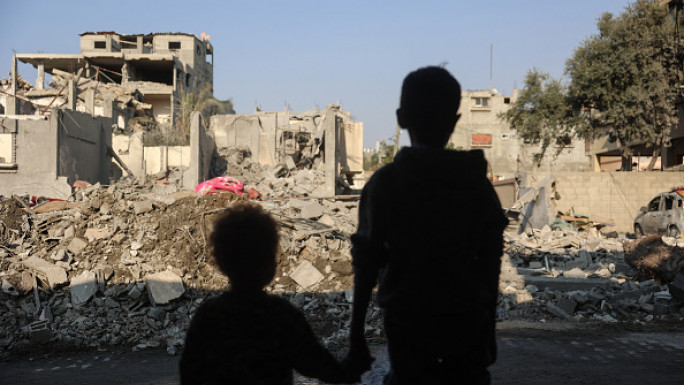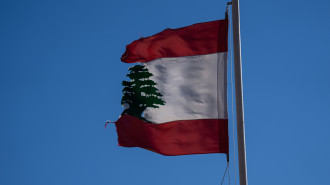Derna: the Libyan breeding ground for IS
The Islamic State group spectacularly announced its arrival in North Africa with the shockingly brutal murder of 21 Egyptian Copts last week in Libya.
But the group has in fact been present in the continent since at least late 2014, when a handful of its fighters arrived in the Eastern Libyan coastal town of Derna, where they founded the new province of Barqa.
It is no accident that the movement first emerged in Derna. The town has had a reputation for extremism ever since the late 1990s when it was put under curfew for at least a year by the Gaddafi's regime in response to support for the Libyan Islamic Fighting Group's campaign against the jamahiriyah state.
The new base
Locals claim that the town was radicalised in the 1980s by Libyans returning from jihad against the Soviets in Afghanistan.
Observers also point out that, given its remoteness on the coast of Cyrenaica, it has always resisted 'foreign' forces, whether General William Eaton's US marines in 1805, Italian forces battling against Libya's great resistance hero, Umar al-Mukhtar, or the Gaddafi regime's suppression of 1996 and 1997.
The "Sinjar records", captured on the Iraqi-Syrian border by US forces in October 2007, revealed that Derna supplied more fighters per head of its 80,000 population to al-Qaeda in Iraq – the forerunner of the IS group – than any other town in the Middle East. It accounted for almost half the 112 Libyans listed among the 606 names in the record.
| In 2011, Derna-based extremists declared an 'Islamic caliphate', although it did not last long. |
With the advent of the revolution in Libya in 2011, Derna-based extremists declared an 'Islamic caliphate', although it did not last long.
The declaration was to presage the future, for in April 2014, 300 Libyans who had joined the IS group returned to the town and swelled the number of militants there to over 1,000.
They joined the small group who had formed the Shura Council for Islamic Youth (SCIY) in the town which had declared for al-Qaeda a month before.
That was to change, for the returnees had been in the IS group's Battar Brigade in Deir ez-Zor in Syria, and later in the Mosul region and were already alienated from al-Qaeda.
As a result, an internecine struggle broke out with two other al-Qaeda affiliates, the Abu Salim Brigade and Ansar al-Sharia, which SCIY was to win.
Its victory was sealed when two official representatives of IS group arrived in Derna, Abu Nabil Anbari, as a personal representative of the IS leader, and Mohammed Abdullah, also known as Abu al-Baraa al-Azdi, a Yemeni or Saudi who became a judge in Derna.
On 5 October 2014, IS supporters took an oath of allegiance to the organisation, followed three weeks later by a public swearing of loyalty to the leader of the group and new "caliph", Abu Bakr al-Baghdadi.
In other words, al-Qaeda had lost its purchase in Derna, despite the continued allegiance of the Abu Salim Brigade to it, and the less certain allegiance of Ansar al-Sharia.
IS spreads across Libya
Over the past five months, IS has capitalised on its new presence in Cyrenaica in eastern Libya to spread out to other cities.
It now claims to have branches in Bayda and Benghazi, in addition to Derna, with a branch in Sirte and a presence in Tripolitania at Khums and the capital, Tripoli.
It has claimed, and was almost certainly responsible, for the attack, on the Corinthia Hotel in Tripoli on 27 January, when nine people were killed. That incident led to clashes between its militants and the Misurata-based Libyan Dawn militias.
The group has also claimed a bombing on the seat of the house of representatives for the internationally-recognised Tobruk government, and another on the Labrak airbase in Bayda.
It has also been responsible for a number of murders in Benghazi and nine suicide attacks that had not been previously formally claimed, thus challenging the Libyan Dignity coalition commanded by General Khalifa Haftar.
In short, despite its relatively recent appearance, IS has proved to be very active indeed and intent on challenging all its possible competitors.
The latest atrocity, the beheading of the Copts on a beach close to Sirte, was also a warning to Europe that it cannot escape the IS group's reach.
The murders were preceded by a speech forecasting the final battle with Rome – one of the many end-times myths with the jahili world – that IS now anticipates.
In the video, the orator made it clear that the choice of the beach for the grisly crime was no accident for, he pointed out, Osama bin Laden had been buried at sea after he had been killed by the US in May 2011.
Even though the Copt murders provoked a devastating Egyptian airborne response, IS seeks engagement with its enemies, for then the final battle – which it believes it will win – can be fought.
Opinions expressed in this article remain those of the author and do not necessarily reflect those of al-Araby al-Jadeed, its editorial board or staff.


![President Pezeshkian has denounced Israel's attacks on Lebanon [Getty]](/sites/default/files/styles/image_684x385/public/2173482924.jpeg?h=a5f2f23a&itok=q3evVtko)



 Follow the Middle East's top stories in English at The New Arab on Google News
Follow the Middle East's top stories in English at The New Arab on Google News


